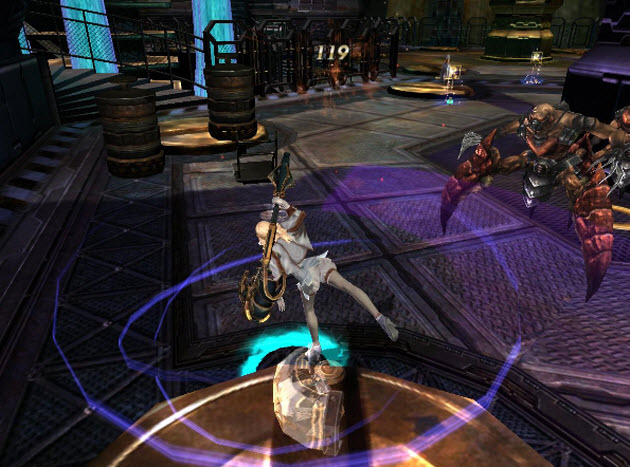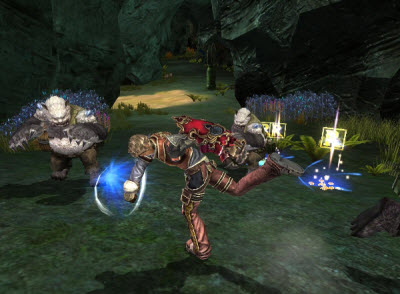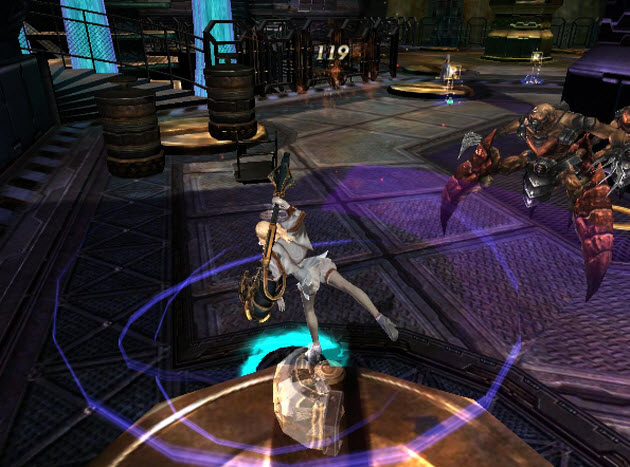 Outspark has been trying to carve out a role in the middle of the online game market for five years. Today, it’s launching a new online action game called Divine Souls that it hopes will spur demand for online market games with faster action and better graphics.
Outspark has been trying to carve out a role in the middle of the online game market for five years. Today, it’s launching a new online action game called Divine Souls that it hopes will spur demand for online market games with faster action and better graphics.
A lot of online games are stuck in two dimensions, or they cost a lot of money, or they take a huge amount of time to play. Outspark’s games are free-to-play, but the company’s betting that the quality of Divine Souls is so good, it will lure in players at both ends of the market: those who are tired of casual games and want more and those who are tired of spending a lot of money on games that take forever to master.
Of course, Outspark could also be hammered by rivals at both ends of the online game spectrum — casual Facebook game companies such as Zynga and hardcore massively multiplayer online game makers such as Blizzard Entertainment. Outspark’s bet is that the middle of the market isn’t a No Man’s Land.
Will the game be popular? It all depends on how fast you want to see the action when you’re pummeling a monster with one sword stroke after another in a kind of endless chain of attacks. Susan Choe, chief executive of San Francisco-based Outspark, calls her target market the “mid-core gamers.” These include both downloadable and light-download browser-based games where users can start playing for free but pay real money for virtual goods in small transactions as they progress.
 Choe founded Outspark in 2007 to bring Asia’s popular free-to-play online games to the U.S. market, mainly because about 6,000 wealthy users in the U.S. will generate as much revenue as 100,000 users in China. The company has managed to grow its audience to a couple of a million users a month (and 7.5 million registered users), although its current monthly user counts are likely below its past peaks. That’s why Divine Souls is such an important game for the company.
Choe founded Outspark in 2007 to bring Asia’s popular free-to-play online games to the U.S. market, mainly because about 6,000 wealthy users in the U.S. will generate as much revenue as 100,000 users in China. The company has managed to grow its audience to a couple of a million users a month (and 7.5 million registered users), although its current monthly user counts are likely below its past peaks. That’s why Divine Souls is such an important game for the company.
With Divine Souls, Outspark didn’t just take a published game from Asia and re-publish it in the U.S. It teamed up with Korean game developer Gameprix and co-produced the game, which is a fast-paced, arcade-style fighting game with rich 3D graphics, including support for 3D glasses.
“We worked on this one from the beginning to the end,” said Philip Yun, chief operating officer of Outspark.
He said that Gameprix’s team of 80 developers worked on the title since 2008, with help from about 11 staffers at Outspark. That’s considerably more effort than usually goes into free-to-play games. The goal was to create a combat game with fluid motion, said Yun. He says the game isn’t merely repetitive, but it requires a skillful gamer for success in fighting. The game also uses sophisticated physics, which isn’t that common in free-to-play online titles. The download size is also fairly small. Closed beta tests began in October.
According to Choe, Divine Souls is the first of a number of titles that were developed in a similar way. Other titles will include first-person shooter games, real-time strategy titles, role-playing games and other genres as well.
Last year, rumors surfaced that Outspark was in talks to be acquired by China’s Shanda Games, but no deal came out of those talks. Outspark raised $8.3 million in venture funding during the dry month of July, 2009 and has raised $22 million to date. Investors include DCM, Syncom Venture Partners, SBI Investment, Mille Plateau, Tencent and Altos Ventures. Rivals are plentiful, from Nexon to Jagex. On the consoles, games such as Mortal Kombat will compete with Divine Souls. Is it “AAA” quality? The graphics look good, though not spectacular. Gamers will decide.
[youtube=http://www.youtube.com/watch?v=_nUGMcSD-uo&w=640&h=390]


